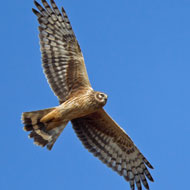Hen harriers '10 times more likely to die or disappear on grouse moors'

“These analyses... confirm what has long been suspected – that illegal persecution is having a major impact on the conservation status of this bird.”
Seven in 10 hen harriers that were satellite tagged in England are thought to have been illegally killed, a long-term study has found.
The research, published in Nature Communications, also revealed that hen harriers are 10 times more likely to die or disappear in areas predominantly covered by grouse moor.
Scientists from Natural England studied 58 tagged hen harriers over a 10-year period. Analysis was led by the University of Cape Town and Aberdeen University, with land use data from RSPB.
Natural England director Rob Cooke said the findings make for “sobering reading”.
Stephen Murphy, who led the data collection for the study, added: “These analyses are a significant step in understanding the fate of tagged hen harriers, and confirm what has long been suspected – that illegal persecution is having a major impact on the conservation status of this bird.”



 The Veterinary Medicines Directorate (VMD) is inviting applications from veterinary students to attend a one-week extramural studies (EMS) placement in July 2026.
The Veterinary Medicines Directorate (VMD) is inviting applications from veterinary students to attend a one-week extramural studies (EMS) placement in July 2026.